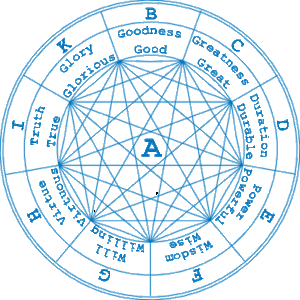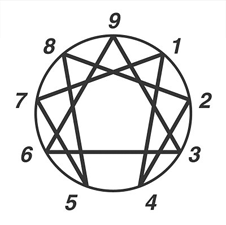Our Approach to the Enneagram
“And we all, who with unveiled faces contemplate the Lord’s glory, are being transformed into his image with ever-increasing glory, which comes from the Lord, who is the Spirit.” - 2 Corinthians 3:18
Mosaic Formation utilizes the Enneagram as a tool for Christian Spiritual Formation. Christian Spiritual Formation can be simply defined as the lifelong journey of being transformed by the love of God the Father into the image and likeness of Jesus through the power of the Holy Spirit, so we can love God and others.
This is the point of whatever we do with the Enneagram. We begin our workshops or consultation sessions with humble prayer, asking the Holy Spirit to help us pay attention to the particular areas in our lives God desires to sanctify and transform in Christlikeness.
The Enneagram is a powerful tool, but we must remember that it is just a tool. The Enneagram is not the end-all be-all of spiritual formation. The Enneagram itself does not transform us, the Holy Spirit does. No human-made tool is without its limitations. If we take an assessment, the results carry no ultimate authority on who we are. But a tool in the hands of a master craftsman can accomplish much. God is the Master Potter, and we are the clay (Isaiah 64:8). The Enneagram is just one of many instruments the Lord might use to shape and form us into something beautiful.
We take an alternative approach to Ichazo’s and Naranjo’s Enneagram of Personality. For one, we de-emphasize the idea that each person is one of nine personality types (or eighteen subtypes if you include the wings).
We are so much more than a single number or type. Our unique personalities bear the traits, gifts, virtues, and vices of all nine numbers in varying degrees. Furthermore, we can expect our resonance with the various numbers to shift over the course of our spiritual journeys as we are transformed by the Spirit. We expect to become more like Jesus in multiple aspects and to experience greater freedom from our vices and besetting sins.
One unfortunate byproduct of the personality-type approach is the widespread usage of overly simplistic identity statements like “I am a TWO” or “you are such a NINE” or “she is definitely a FIVE.” Statements like this have the potential to greatly limit people’s thinking about themselves and other people. They can also lead to false assumptions and judgments about oneself and others. Rather than viewing how we are being transformed holistically across the spectrum of all nine numbers, we can grow narrowly focused on becoming a better, more redeemed version of our “type.” While our journey of transformation into Christlikeness often relates to aspects of a predominant personality style, we can anticipate that the Holy Spirit’s work within us will often go beyond those areas as well.
When we companion others with the Enneagram, we explore the WEPSS scores for all nine numbers. The WEPSS provides three sets of meaningful scores for each number: resourceful, less-resourceful and total scores. We prefer to look at each Enneagram number as a set of traits (e.g., gifts, virtues, vices) rather than a personality type. Therefore, an individual may relate with the gifts and strengths, as well as the vices and deadly sins, of more than one number. Truly no two individuals are the same—each child of God is fearfully and wonderfully made (Psalm 139:13-14)! When you sign up for an Enneagram workshop, consultation, or coaching session with us, our job is to help you explore and consider possible insights from your unique WEPSS profile. We highlight notable scores and patterns from your report, but ultimately the interpretation of the scores and what to do next with them is between you and the Holy Spirit. Our prayer is that we will come away with with a renewed sense of awe at how we personally and specifically reflect our Creator and with greater clarity about how God is at work within to transform us into Christ’s image.
History of the Enneagram
No individual or faith tradition can claim to be the creator or ultimate authority on the Enneagram. There have been diverse influences, expressions and applications throughout its history. Below we highlight a few of the Enneagram’s notable historical influences:
Evagrius Ponticus (345-399 AD) was a fourth century Christian monk who identified eight vices: Gluttony, Lust, Avarice (Greed), Sadness, Anger, Acedia (Sloth), Vainglory (Deceit), and Pride. Two centuries later, St. Gregory the Great (590 AD) revised the list into what is famously known as the Seven Deadly Sins: Lust, Gluttony, Greed, Sloth, Wrath, Envy, and Pride. Vices and Deadly Sins have been a prominent feature of Christian spirituality teachings for centuries, with the Enneagram contributing to a resurgence of interest and attention in them in modern times.
Ramon Llull (1232–1316) was a 13th-14th century Franciscan theologian and mathematician who created several nine-pointed diagrams, including this one published in Ars Brevis in 1307 that highlighted nine virtues of God.

The exact origin of the Enneagram diagram consisting of a circle, triangle, and hexad is unknown, but was made public in 1916 by the enigmatic Armenian mystic George Gurdjieff (1875-1949). Gurdjieff sought spiritual wisdom from various faith traditions including Muslim Sufism, Hinduism, Buddhism, and Christianity. Gurdjieff believed this symbol to be a source of special knowledge about the cosmos because of the mathematical laws (the law of seven and the law of three) it represented.

From ancient times until Gurdjieff, the Enneagram symbol in fact had little to do with personality types. The Enneagram of Personality framework was developed later by Bolivian philosopher Oscar Ichazo (1931-2020) in the 1950s and 60s. Ichazo claimed to receive supernatural revelation about the connection between the Enneagram symbol and the nine personality types while under a trance. One of Ichazo’s pupils, Chilean psychologist Claudio Naranjo (1932-2019) brought the Enneagram of Personality to the United States and integrated it with concepts from Western psychology. He later instructed Catholic teachers who further integrated facets of Christian spirituality with the personality typology.
In summary, there have been diverse historical influences that have shaped what we read about or teach on the Enneagram today. We may find ourselves feeling comfortable about some of these influences, and queasy about some others. What is an appropriate Christian response to the Enneagram? We believe that the content, meanings, and application of Enneagram teachings need to be carefully tested and filtered through our understandings from Scripture. We seek to do our best to integrate the parts that are helpful, and to filter out the parts that are incompatible with our Christian faith.
The Enneagram of Christlike Virtues excludes some of the more recent emphasis on personality types but retains a lot of the valuable wisdom and insight about deadly sins and Christlike virtues that are an important part of Christian spirituality.
If you are interested in receiving Enneagram services such as individual/couples/group consultations, private workshops, or training, please fill out the interest form below. We will prayerfully consider each request and let you know within one week whether we are available to serve you.